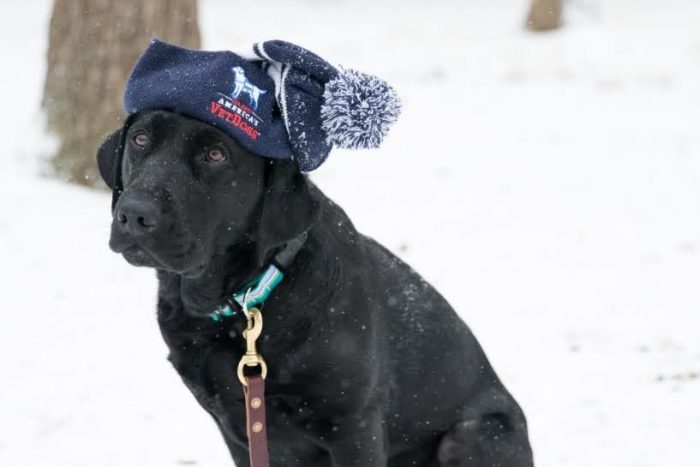Cold weather care tips to keep dogs safe during the winter season
December 21 marks first day of winter
America’s VetDogs, a Long Island-based national nonprofit that provides specially trained guide and service dogs to Veterans and First Responders with disabilities, is encouraging everyone to keep their dogs in top shape during the coming winter months. Despite the popular misconception, a dog’s fur coat is not enough to protect them from the elements. Much like people, dogs have varying degrees of tolerance when it comes to temperature extremes. Below is a list of care tips for dogs this cold weather season.
- Be attentive to your dog’s body temperature and limit time outdoors.
- Remove any sharp objects from your property before the snow flies as with snow on the ground, it’s difficult for dogs to see things like jagged rocks, sharp edged toys, even left-out garden tools.
- Keep your dog warm, dry and away from drafts. Tile and uncarpeted areas may become extremely cold, so make sure to place blankets and pads on floors in these areas.
- Provide plenty of fresh water. Your dog is just as likely to get dehydrated in the winter as in the summer.
- Prevent frostbite on your dog’s ears, tail, and feet by not leaving them outdoors for too long.
- Supplemental heat sources like fireplaces and portable heaters can severely burn your dog. Make sure all fireplaces have screens and keep portable heaters out of reach.
- Your dog needs a well-groomed coat to keep properly insulated. Short- or coarse-haired dogs may get extra cold, so consider a sweater or coat if it does not impede the use of a harness. Long-haired dogs should have excess hair around the toes and foot pads trimmed to ease snow removal and cleaning.
- Towel or blow-dry your dog if they get wet from rain or snow. It is important to dry and clean its paws, too. This helps avoid tiny cuts and cracked pads. A little petroleum jelly may soften the pads and prevent further cracking.
- Don’t leave your dog alone in a car with the engine off and no proper precautions as the temperature in the car will get too cold.
- Antifreeze, which often collects on driveways and roadways, is highly poisonous. Although it smells and tastes good to your dog, it can be lethal.
- Rock salt, used to melt ice on sidewalks, may irritate footpads. Rinse your dog’s feet after a walk with a warm, damp cloth or towel and be sure to dry them off afterwards.
- Don’t use over-the-counter medications on your dog without consulting a veterinarian. If you think your pet has eaten something potentially dangerous, call your veterinarian or a pet poison control center right away.
- Dogs can be more susceptible to illness in the winter. Take your dog to a veterinarian if you see any suspicious symptoms.







